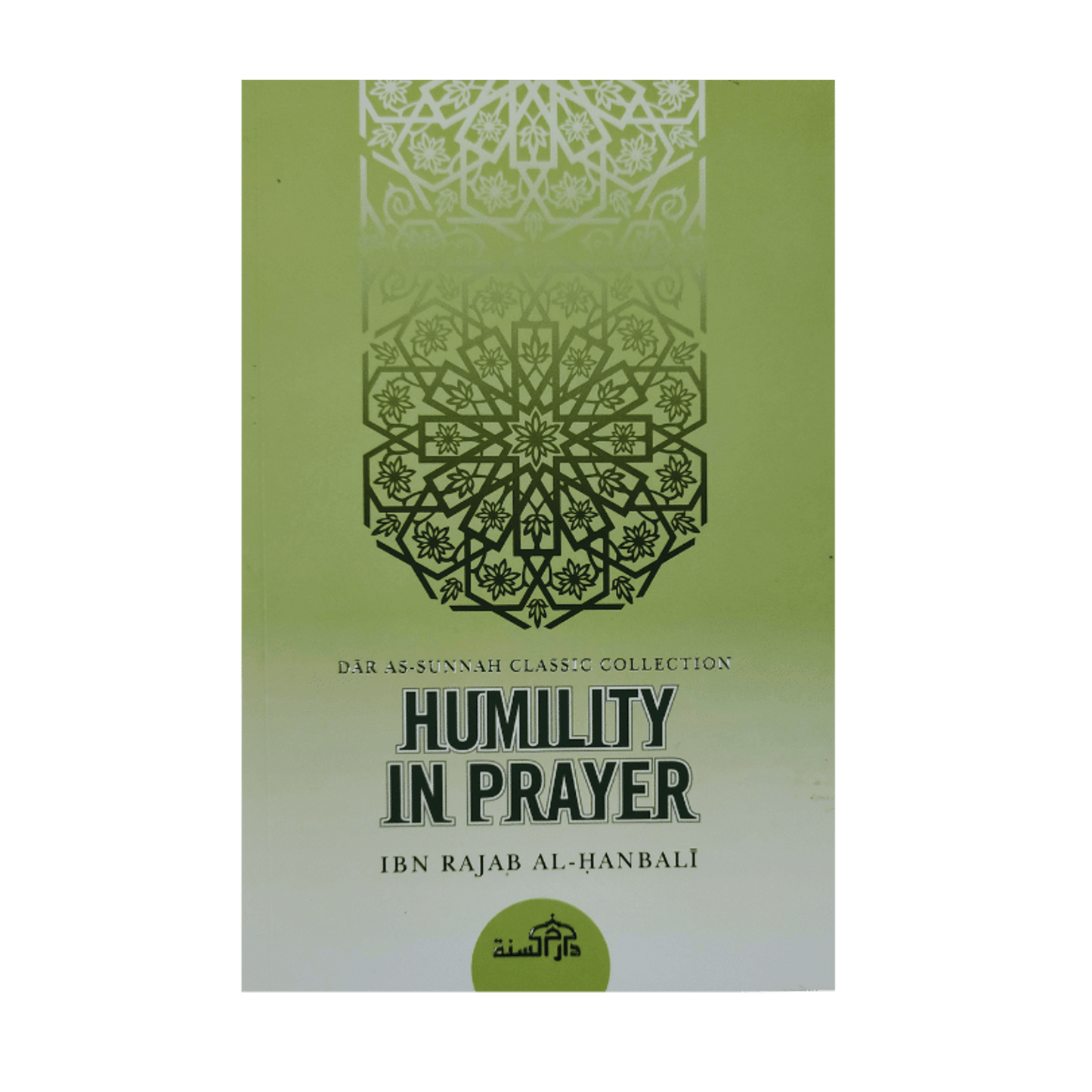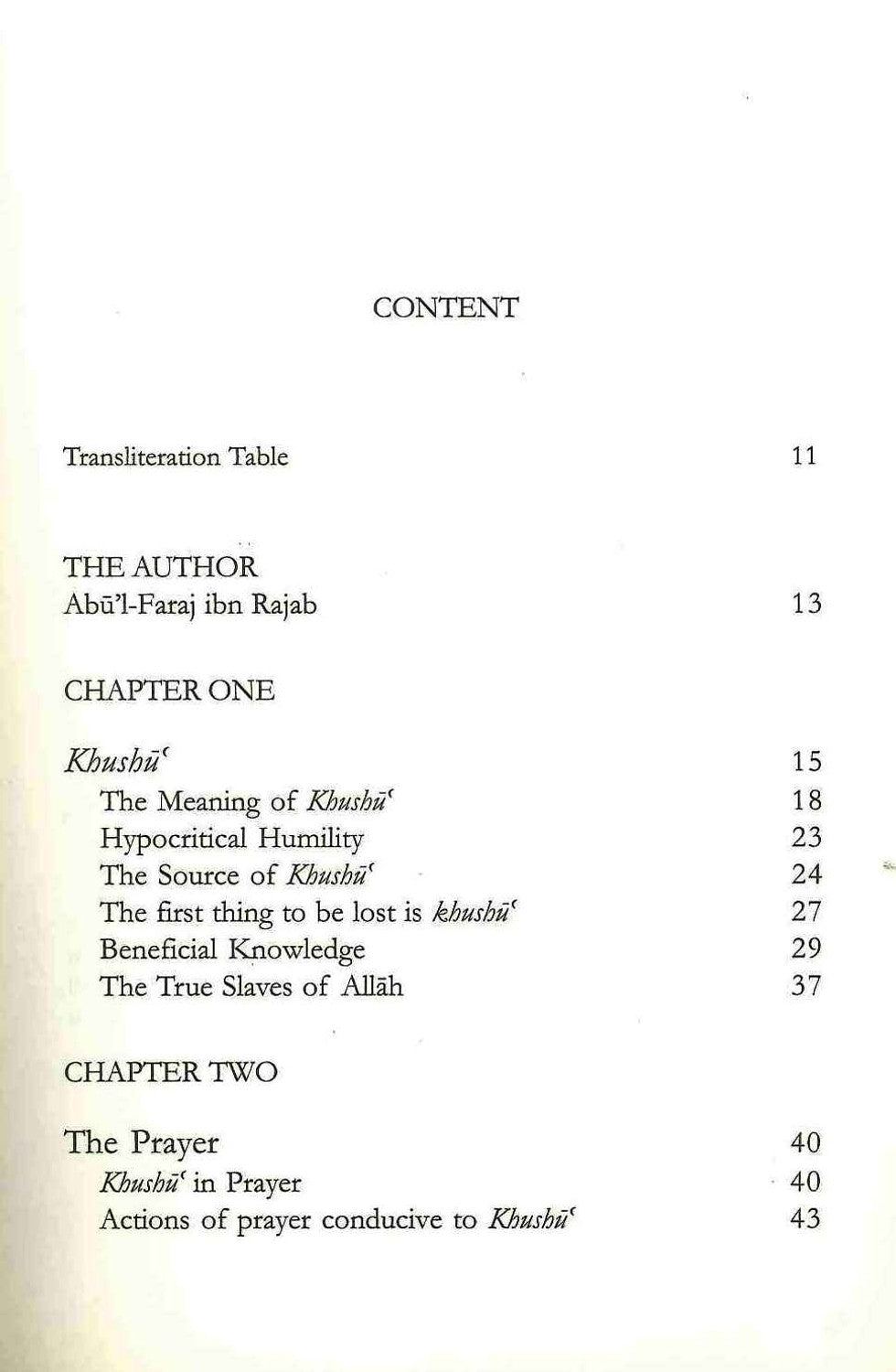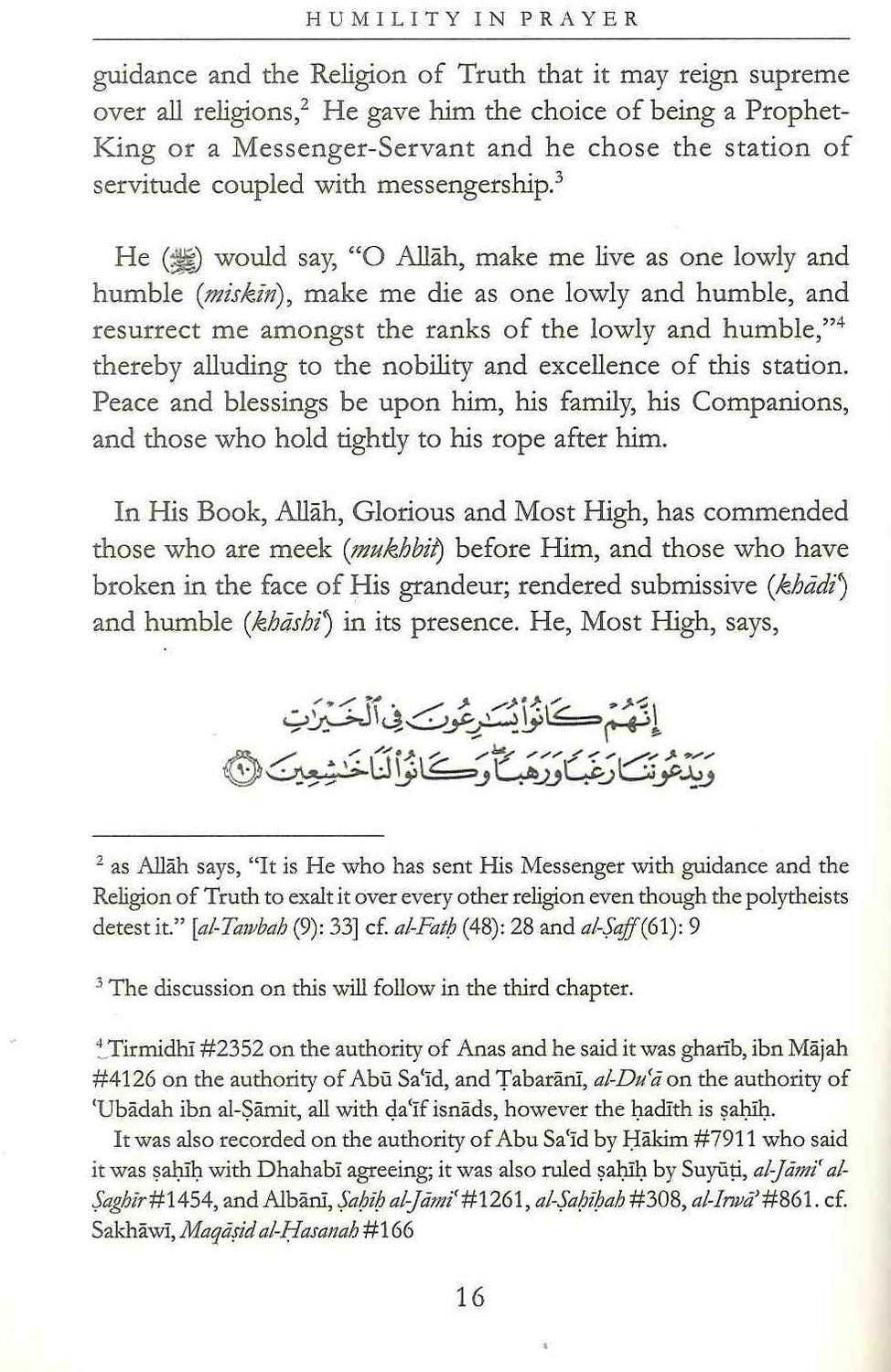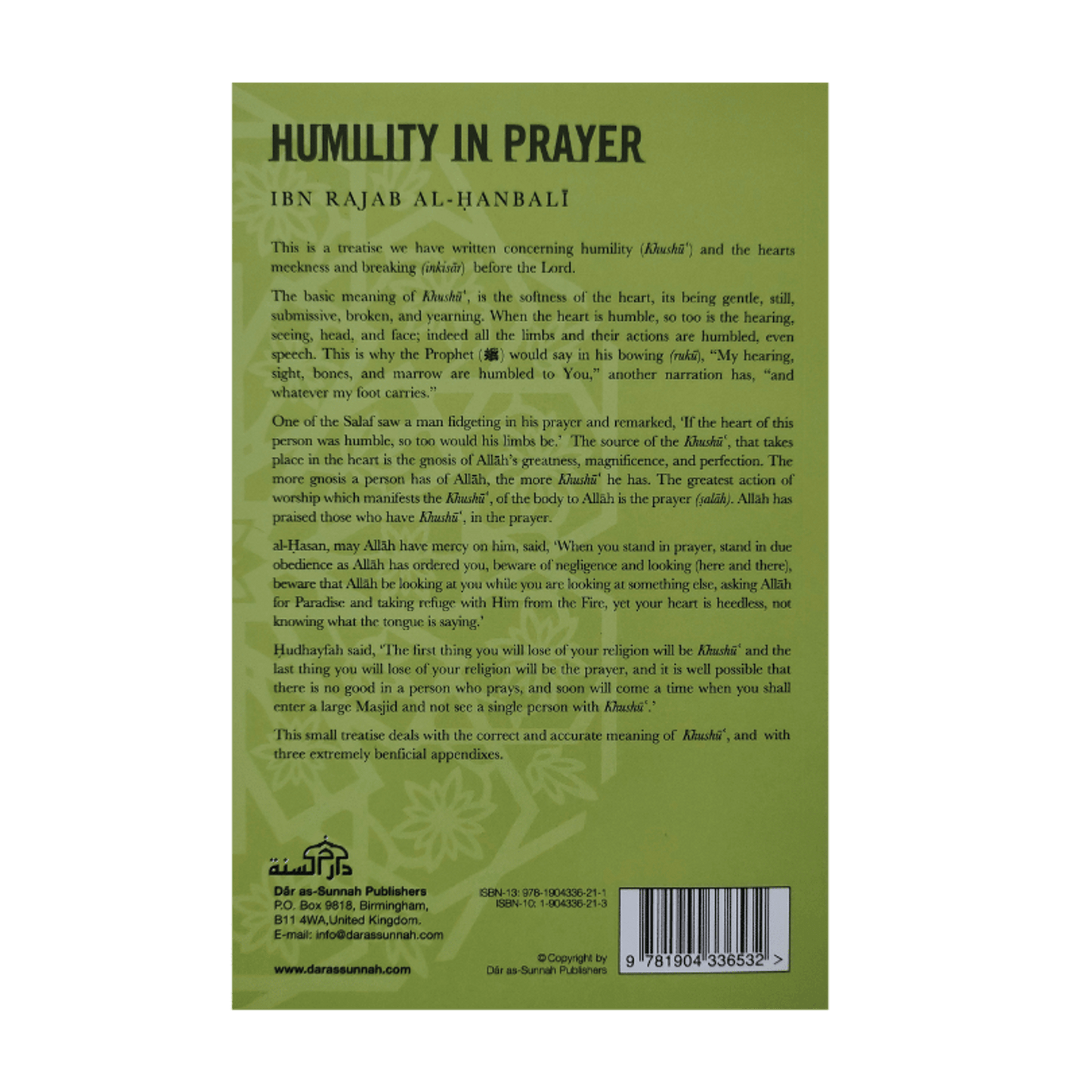Dar As Sunnah Publications By Ibn Rajab Al-Hanbali
Dar As Sunnah Publications By Ibn Rajab Al-Hanbali
Product Details
Product Details
- Ibn Rajab Al-Hanbali
- Dar As Sunnah Publications
- A5 |5.8 x 8.3 in| 14.8x 21 cm
- Soft Cover
- Hadith
Couldn't load pickup availability
The Humility in Prayer
This work delves into the concepts of humility (Khushu) and the breaking of hearts (inkisar) before the Almighty. Khushu is defined as the softness, gentleness, stillness, submission, brokenness, and yearning of the heart. When the heart is humble, so too are the senses and physical gestures, including speech. The Prophet himself would express his humility in prayer, saying, "My hearing, sigh, bones, and marrow are humbled to You," or in another narration, "and whatever my foot carries." One of the early Muslims observed, "If this person's heart was humble, so too would his limbs be." The foundation of Khushu in the heart is the recognition of Allah's greatness, magnificence, and perfection. The more a person knows Allah, the stronger their Khushu will be. The most important act of worship that demonstrates Khushu is prayer (salah). Allah has praised those who have




Sample Pages
Page : 01
DAR AS-SUNNAH CLASSIC COLLECTION HUMILITY IN PRAYER IBN RAJAB AL-HANBALI دار السنة
Page :02
Transliteration Table THE AUTHOR CONTENT 11 Abu'l-Faraj ibn Rajab 13 CHAPTER ONE Khushu 15 The Meaning of Khushu 18 Hypocritical Humility 23 The Source of Khushu' 24 The first thing to be lost is khushu 27 Beneficial Knowledge 29 The True Slaves of Allah 37 CHAPTER TWO The Prayer Khushu' in Prayer Actions of prayer conducive to Khushu 40 40 440 43
Page : 03
HUMILITY IN PRAYER guidance and the Religion of Truth that it may reign supreme over all religions,2 He gave him the choice of being a Prophet- King or a Messenger-Servant and he chose the station of servitude coupled with messengership.3 224 He() would say, "O Allah, make me live as one lowly and humble (miskin), make me die as one lowly and humble, and resurrect me amongst the ranks of the lowly and humble,' thereby alluding to the nobility and excellence of this station. Peace and blessings be upon him, his family, his Companions, and those who hold tightly to his rope after him. In His Book, Allah, Glorious and Most High, has commended those who are meek (mukhbit) before Him, and those who have broken in the face of His grandeur; rendered submissive (khādi) and humble (khashi) in its presence. He, Most High, says, إِنَّهُمْ كَانُوا يُسَرِعُونَ فِي الْخَيْرَاتِ وَيَدْعُونَنَا رَغَبَا وَرَهَباً وَكَانُوا لَنَا خَشِعِينَ 2 as Allah says, "It is He who has sent His Messenger with guidance and the Religion of Truth to exalt it over every other religion even though the polytheists detest it." [al-Tawbah (9): 33] cf. al-Fath (48): 28 and al-Saff (61): 9 3 The discussion on this will follow in the third chapter. 4 Tirmidhi #2352 on the authority of Anas and he said it was gharib, ibn Majah #4126 on the authority of Abu Sa'id, and Ţabarani, al-Du'a on the authority of 'Ubadah ibn al-Samit, all with da'if isnāds, however the hadith is sahih. It was also recorded on the authority of Abu Sa'id by Hakim #7911 who said it was şahiḥ with Dhahabi agreeing; it was also ruled şahiḥ by Suyuti, al-Jami' al- Saghir #1454, and Albānī, Sahih al-Jami' #1261, al-Sabiḥah #308, al-Irwa' #861. cf. Sakhawi, Maqasid al-Hasanah #166 16
Page :04
HUMILITY IN PRAYER IBN RAJAB AL-HANBALI This is a treatise we have written concerning humility (Khushi') and the hearts meckness and breaking (inkisar) before the Lord. The basic meaning of Khushi', is the softness of the heart, its being gentle, still, submissive, broken, and yearning. When the heart is humble, so too is the hearing, seeing, head, and face; indeed all the limbs and their actions are humbled, even speech. This is why the Prophet (8) would say in his bowing (ruku), "My hearing, sight, bones, and marrow are humbled to You," another narration has, "and whatever my foot carries." One of the Salaf saw a man fidgeting in his prayer and remarked, 'If the heart of this person was humble, so too would his limbs be. The source of the Khushu', that takes place in the heart is the gnosis of Allah's greatness, magnificence, and perfection. The more gnosis a person has of Allah, the more Khushu' he has. The greatest action of worship which manifests the Khushu', of the body to Allah is the prayer (salah). Allah has praised those who have Khushu', in the prayer. al-Hasan, may Allah have mercy on him, said, 'When you stand in prayer, stand in due obedience as Allah has ordered you, beware of negligence and looking (here and there), beware that Allah be looking at you while you are looking at something else, asking Allah for Paradise and taking refuge with Him from the Fire, yet your heart is heedless, not knowing what the tongue is saying.' Hudhayfah said, "The first thing you will lose of your religion will be Khushu' and the last thing you will lose of your religion will be the prayer, and it is well possible that there is no good in a person who prays, and soon will come a time when you shall enter a large Masjid and not see a single person with Khush"." This small treatise deals with the correct and accurate meaning of Khushi", and with three extremely benficial appendixes. دار السنة Dár as-Sunnah Publishers P.O. Box 9818, Birmingham, B11 4WA,United Kingdom. E-mail: info@darassunnah.com www.darassunnah.com ISBN-13: 978-1904336-21-1 ISBN-10: 1-904336-21-3 Copyright by 9 781904 336532> Dár as-Sunnah Publishers
Ibn Rajab Al-Hanbali
Ibn Rajab al-Hanbali (1335–1393 CE) was a prominent Islamic scholar from the Hanbali school of jurisprudence, renowned for his deep knowledge of hadith, fiqh (Islamic jurisprudence), and Islamic spirituality. He is best known for his works on the virtues of the Islamic faith, such as Lata'if al-Ma'arif (The Subtle Blessings), which highlights the significance of Islamic holidays, acts of worship, and recommended practices. Ibn Rajab was also an expert in the science of hadith and authored works that discussed the lives and biographies of prominent scholars and the importance of piety and sincerity in worship. His scholarship continues to be highly regarded, especially for its emphasis on spirituality and ethical conduct.




